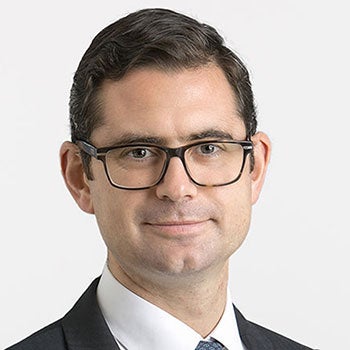
Private markets

Our solutions team holds a neutral view on alternative investments due to strong, but weakening, fundamentals and valuations that are roughly in line with history.
With asset-specific outlooks, it is our view that the recessionary environment could make senior loans more attractive to investors compared to other high-yielding asset classes.
We believe our real estate opportunities are likely to be insulated against inflation, while gold could cushion portfolios from a possible downturn in risky assets.
We offer an extensive range of alternative investments. Our scale, combined with the breadth and depth of our offering, means we have the flexibility to meet your needs as markets evolve.
With high and persistent inflation, rising interest rates, widening credit spreads, and significant equity market volatility, investors are facing a barrage of macroeconomic challenges. Given these headwinds, we believe that alternatives remain attractive for their diversification benefits.
In our assessment of the alts investment universe, our Solutions team offer some insight to areas of opportunity within private markets in 2023, while investment teams share asset class specific views.

Private markets
Private markets may be a way for investors to diversify their portfolios to meet their objectives, whether enhancing growth with private equity, finding income in direct lending, or diversification through real assets.
These conditions are most clear in our regime signal, which is presently at unattractive levels due to high and rising volatility. Combining the difficult backdrop with the latest data available for private markets, our framework leads us to the conclusion that all asset classes, direct lending, private equity, and real assets, are presently neutral. This is due to strong but weakening fundamentals and valuations that are roughly in line with history.
Within private credit and senior loans, spreads have held up relative to public assets, leading to an attractive valuation rating.
We are neutral on fundamentals as it has become evident that borrowing conditions have tightened, thus negatively impacting interest coverage ratios, which is beginning to be reflected in the data. Real estate financing conditions have been impacted by recent and sharp increases in interest rates, most notably in the US.
The full effects upon capital flows, pricing and fundamentals are yet to be realised due to lagged effects.
Looking forward, real estate investors are focused on the impact of the macroeconomic forces on the broader GDP growth outlook and more specifically on how these may translate into capitalisation rate movements, which are tightening from very attractive levels across an array of benchmark bond measures.
While present valuations are not likely representative of current clearing prices, we remain optimistic on long-term, secular drivers within real estate, taking a defensive approach while remaining opportunistic amid volatility.

Senior loans
While there are questions around the US Federal Reserve’s policy to increase rates, the market expects at least another 150 basis points of rate increases before a levelling off in 2024. Increased interest rates would drive higher levels of income for senior loan investors, due to the floating rate nature of the asset class. “We expect coupons to continue to increase as a hawkish Fed attempts to quell inflation,” according to the Invesco Fixed Income team.
If the Fed continues to raise interest rates, investors may start to become concerned about issuers’ ability to service their debt. However, as highlighted in the below table, the average borrower has entered this cycle in a strong position. Interest coverage ratios at the end of 2021 were near their highs, leaving companies with sufficient ability to absorb higher interest expense.
Furthermore, as the world braces for a recession, the senior secured status of this asset class could leave it looking more attractive to investors than other high-yielding asset classes. Indeed, senior loans are secured to underlying collateral, which means they are the first part of the capital structure to be repaid in the event of a default. While defaults are still very low, the secured nature of the asset class has translated to higher historical recovery rates (60-70%) compared to other subordinated asset classes.
Source: LCD Pitchbook as of 30 September 2022.

Real estate
In the second half of 2022 volatility in financial markets has persisted amid global inflationary pressures. While our European base case is for a short period of mild recession in key European real estate markets, we believe that real estate returns will continue to exhibit increasing asset-specific divergence with markets and sectors. This could present opportunities for investors with local market knowledge.
Persistent structural tailwinds are also likely to continue to shape long-term demand, with urbanisation being a core driver of growth in key European cities. Market disruption, particularly around financing events, is already starting to drive attractive investment opportunities across our European markets.
As we head into 2023, we continue to invest in our conviction opportunities, which we believe are insulated against inflationary pressures and offer protection against future interest rate increases. We maintain our approach to conviction-aligned environmental, social and governance (ESG) improvement opportunities. In particular where we can supply well-located Grade A assets into structural demand, or where the current market dislocation offers opportunities to acquire at a discount to the long-term value.

Gold
We believe gold could be more compelling to investors who want to cushion their portfolios from a possible downturn in risky assets, especially if they think the US dollar could weaken in 2023. Although gold has historically fared well during periods of high inflation, the strength of the greenback versus other major currencies has been one of the main headwinds in 2022, along with rising bond yields and higher interest rates. The relationship between these factors is such that we could see gold benefit from, for instance, a Fed pivot away from its current tightening phase.
If the US economy weakens further, as many expect, and inflation shows signs of easing, investors may start looking beyond Fed rate hikes. Recessionary conditions are generally favourable for the gold price, and geopolitical tensions involving not only Russia but also China and North Korea could provide further support to the gold price. Investors wanting to gain exposure efficiently may wish to consider a holding in gold through a physically backed exchange-traded product.
A broad range of investments fall into the ‘alternatives’ asset class, including real estate, private credit and senior loans, private equity, infrastructure and hedge funds. The asset class is growing, as investors continue to turn to alternatives for diversification and to navigate challenging market conditions.
Alternative assets often behave differently to public market assets like equities and bonds. Their unique characteristics mean that they can help investors achieve a diversified portfolio. Typically, they are likely to generate higher returns than public market assets.
We manage over $199 billion in alternative strategies, spanning private credit, real estate, private equity and beyond.
i Revenue per available room
The value of investments and any income will fluctuate (this may partly be the result of exchange rate fluctuations) and investors may not get back the full amount invested.
This document is marketing material and is not intended as a recommendation to invest in any particular asset class, security or strategy. Regulatory requirements that require impartiality of investment/investment strategy recommendations are therefore not applicable nor are any prohibitions to trade before publication. The information provided is for illustrative purposes only, it should not be relied upon as recommendations to buy or sell securities.
Where individuals or the business have expressed opinions, they are based on current market conditions, they may differ from those of other investment professionals, they are subject to change without notice and are not to be construed as investment advice.
2601194